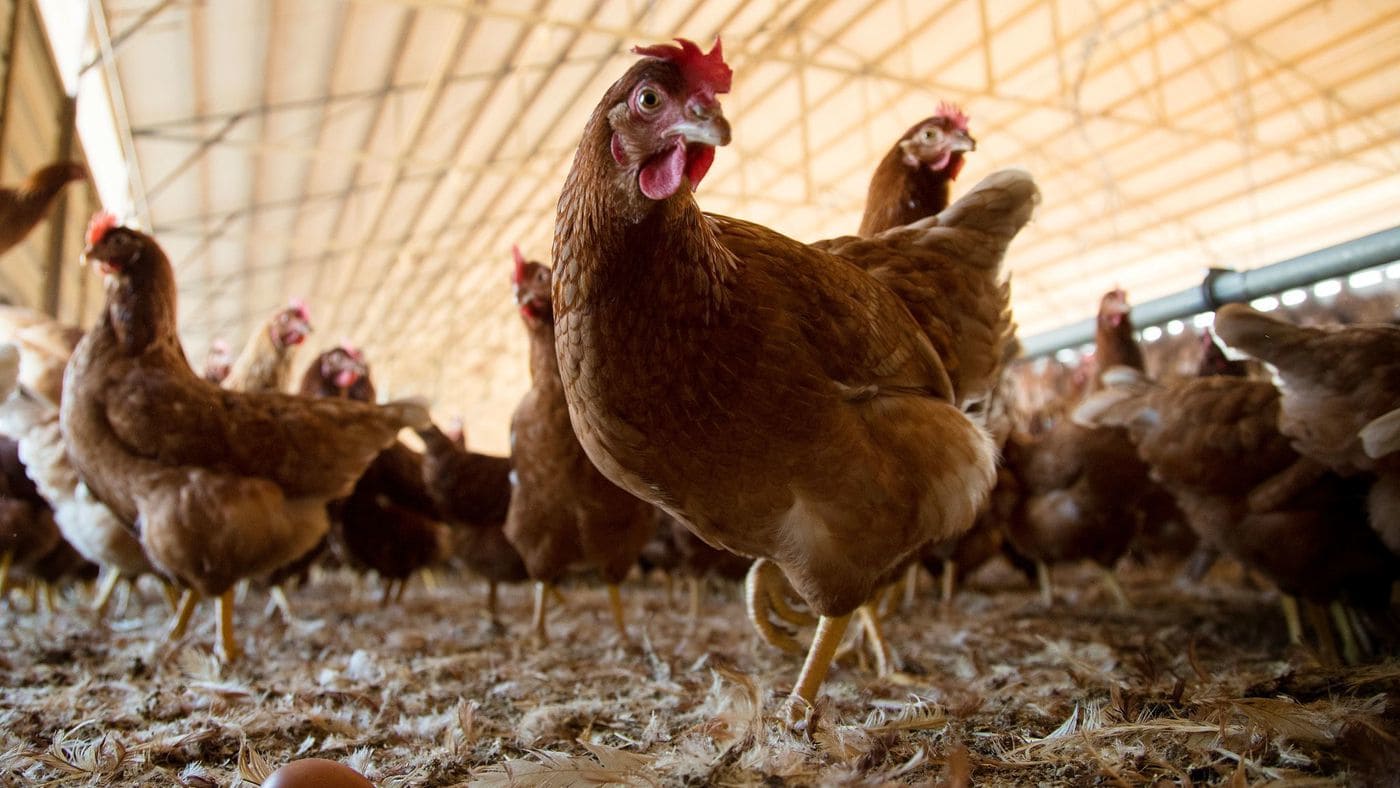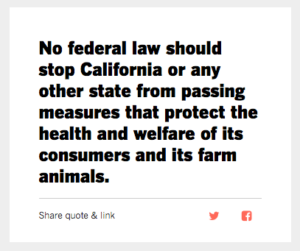LA Times: Hey, Congress — don’t mess with California’s eggs

Chickens roam freely at the MCM Poultry facility in Nuevo, California on Nov. 9. (Los Angeles Times)
by The Times Editorial Board | Dec 21, 2017
Nearly a decade ago, California became the first state in the nation to pass a law requiring that hens, veal calves and pregnant pigs be raised in cages that gave them space to move. The most notable effect of the measure — Proposition 2 in 2008 — was to bar the sale of eggs produced by hens jammed into cramped cages. Shortly after that, the state Legislature passed a companion law (AB 1437) mandating that any farmer in the country who wanted to sell eggs in California had to comply with the welfare standards set for hens in the state.
Ever since, farmers and officials from various other states have balked at the requirement, claiming it violates the Constitution’s protections for interstate commerce. A federal appeals court panel rejected such a claim last year, holding that AB 1437 wasn’t unconstitutional because it applies evenly to in-state and out-of-state producers. More recently, a dozen states have jointly asked the U.S. Supreme Court to block the law.
One of the law’s most vocal Congressional opponents is Rep. Steve King (R-Iowa), who represents the largest egg-producing district of the largest egg-producing state in the country. He’s pushing the Protect Interstate Commerce Act (H.R. 3599), which would prohibit any state from setting more restrictive standards for out-of-state agricultural products than the federal government imposes nationally or the producer’s own state mandates.
 Nearly four years ago, King authored a similar measure and persuaded his House colleagues to incorporate it into that year’s version of the Farm Bill, which authorizes federal farm programs. It didn’t make its way into the version signed into law by President Obama, however. Undeterred, King is expected to try to attach his current proposal to the Farm Bill that’s scheduled to move through Congress next year.
Nearly four years ago, King authored a similar measure and persuaded his House colleagues to incorporate it into that year’s version of the Farm Bill, which authorizes federal farm programs. It didn’t make its way into the version signed into law by President Obama, however. Undeterred, King is expected to try to attach his current proposal to the Farm Bill that’s scheduled to move through Congress next year.
This is a bad and harmful measure, and the House Agriculture Committee should reject it. Given that it would invalidate laws that California legislators have enacted on food safety and animal welfare, along with the state’s ability to protect California consumers, we would particularly ask House Majority Leader Kevin McCarthy — a Republican from Bakersfield — and the four California lawmakers on the House Agriculture Committee to work to keep King’s proposal out of the Farm Bill.
It’s worth remembering why California voters approved Proposition 2 in the first place. An overwhelming majority considered it cruel to keep egg-laying hens their entire short lives in cages so tiny they couldn’t even spread their wings. But King’s proposal would not only interfere with the humane standards some states have set for egg-laying hens in factory farms, it would invalidate numerous state laws across the country that govern agricultural production.
For starters, it could interfere with laws forbidding the slaughter of horses and dogs for human consumption. It could have an effect on laws requiring the labeling of farm-raised fish and Maryland’s state ban on arsenic in poultry feed (which is sometimes added to prevent infections and promote growth in the birds). It could thwart restrictions that states have passed to protect against invasive pests. According to the Humane Society, it could even nullify state laws that bar the sale of puppies bred in facilities that fail to meet the state’s animal welfare standards.
Ideally, there would be uniform federal standards for consumer safety and animal welfare, not a patchwork of state laws governing agricultural production. But that isn’t the case. And in many instances, states are setting more up-to-date standards when the federal government has been unwilling or unable to do so.
That’s one reason why California has a law preventing what is now widely seen as the cruel confinement of egg-laying hens — along with a law that makes all egg producers selling in California, whether they are based in the state or outside it, follow the same standards. While attempts to write uniform, updated national standards for egg producing hens have gotten hopelessly bogged down in politics, several other states — Massachusetts, Michigan, Oregon and Washington — have enacted their own protections for hens. And increasingly, farmers in other states without humane standards for hens will be compelled to convert to cage-free operations as giant companies buying eggs — like Costco, for example — move toward selling or using eggs only from cage-free hens.
In the meantime, no federal law should stop California or any other state from passing measures that protect the health and welfare of consumers and farm animals.